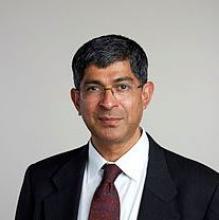Seminar by Prof. John Kuriyan, (Howard Hughes Medical Institute, Professor, University of California, Berkley)
13 Aug 2018
1st Floor, F. C. Kohli Auditorium Room, Department of Computer Sceince & Engineering
Understanding how mutations break cancer-causing cellular switches
About Speaker
John Kuriyan, is an Indian origin eminent scientist whose work involves studying the structure and mechanism of enzymes that transduce cellular signals and perform DNA replication with special focus on Cancer. Berkeley. The interdisciplinary nature of the work lead to him making contributions both in Chemistry as well as Biology as is evident from his laboratory being a part of Physical Biosciences. His works bordersMany of his works are published in high impact and prestigious journals like Nature, PNAS, Elife, Cell etc. He is currently a Chancellor's Professor at the University of California, Berkeley in the departments of Molecular and Cell Biology (MCB) and Chemistry. He is also a Faculty Scientist in Chemistry in Berkeley Lab's Physical Biosciences Division, a Howard Hughes Medical Institute investigator, and a member of the National Academy of Sciences.
Prof. Kuriyan received his B.S. in chemistry from Juniata College in Pennsylvania, followed by his PhD at the Massachusetts Institute of Technology supervised by Gregory Petsko and Martin Karplus. He did his postdoctoral research work for one year under the supervision of Prof. Karplus at Harvard before becoming a youngest assistant professor at the Rockefeller University. He is recipient of many accolades. To mention, he was awarded Loundsbery Award in 2005 by the National Academy of Sciences, recognition presented annually to a single scientific investigator, under the age of 45, who has made significant contributions to medicine or biology.
Abstract
Ras and many other proteins that are oncogenic, i.e., associated with
cancer when mutated, are allosteric switches. The growing power of gene
synthesis and next-generation sequencing can be harnessed to yield
insights into molecular mechanism in a novel way. This lecture will cover
the application of high-throughput mutagenesis to Ras, a protein that is
frequently mutated in cancer.



